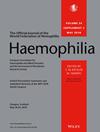Qualification Criteria of Gene Therapy for Haemophilia—Opinion of the EAHAD Gene Therapy Working Group
Abstract
Background
Following the approval of the first gene therapies for haemophilia, it is essential to develop an optimal infrastructure for the administration of gene therapy. This can be ensured by identifying the criteria for the definition of treatment centres (hub centres) and follow-up centres (spoke centres), as well as establishing effective cooperation between them.
Methods
The interdisciplinary members of the EAHAD Gene Therapy Working Group answered a survey to define requirements for centres participating in gene therapy care, addressing aspects such as product administration, coagulation parameter monitoring, and long-term safety surveillance.
Results
The majority support the implementation of standardised protocols. Hub centres are expected to maintain high standards of quality and flexibility, possess pharmacist expertise, ensure regulatory compliance, and have experience in gene therapy Spoke centres should be certified haemophilia centres, access to hepatologists and providing 24-h support. Prior to gene therapy, spoke centres manage initial patient interactions, while hub centres handle complex care needs. Post-therapy, both centres can monitor factor levels and liver health. However, hub centres are responsible for managing immunosuppression and facilitating specialist consultations. Collaboration between both centres is crucial for data sharing and the assessment and resolution of adverse events, emphasising the importance of timely test results and regular liver imaging.
Conclusion
The survey results highlight essential criteria for the safe and effective delivery of gene therapy through a structured hub-and-spoke model. These include accreditation, clinical trial experience, access to specialized healthcare professionals, and the establishment of standard operating procedures for monitoring and managing adverse events.


 求助内容:
求助内容: 应助结果提醒方式:
应助结果提醒方式:


